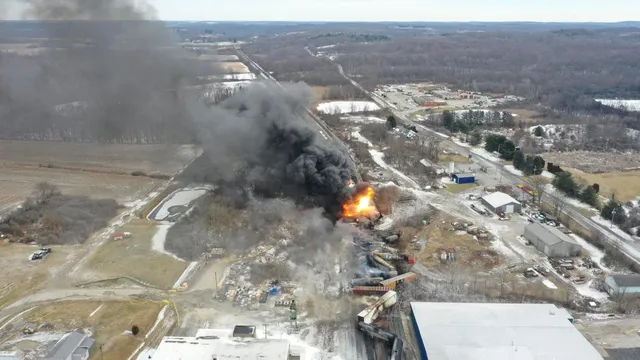
Norfolk Southern seeks $600 million from GATX and OxyVinyls after derailment
2025-03-30 20:05- Norfolk Southern filed a motion for a trial slated to begin to determine financial responsibility for damages due to a derailment.
- The company claims GATX owned the railcar that caused the incident, while OxyVinyls allegedly provided misleading information about the chemicals involved.
- The outcome will clarify which of the companies will contribute to the $600 million class-action settlement.
Express your sentiment!
Insights
In the United States, specifically near the Ohio-Pennsylvania border, a significant train derailment occurred on February 3, 2023. The incident involved a Norfolk Southern train that caused extensive damage and the release of toxic chemicals, notably vinyl chloride. The derailment resulted in a class-action settlement of $600 million, which Norfolk Southern is now seeking to share with two other companies, GATX and OxyVinyls, arguing they bear partial responsibility for the incident. The railcar owned by GATX was identified as the cause of the derailment due to an overheating bearing that led to the fire, facilitating the subsequent spill of hazardous materials. Norfolk Southern has filed a motion that will lead to a trial to determine the financial sharing of the settlement costs. The trial is set to last two to three weeks and will only affect which of the companies is responsible for paying the settlement, not the amounts residents or other entities will ultimately receive. It has been pointed out that while residents have begun receiving some payments from the settlement, pending appeals have delayed the full disbursal of funds. This legal case comes on the heels of Norfolk Southern's previous efforts, where they lost a lawsuit aimed at getting GATX and OxyVinyls to share the costs of environmental cleanup associated with the derailment. The railroad asserts that it has borne the entire burden of costs connected to the disastrous event, which has exceeded $1 billion. Norfolk Southern maintains there is sufficient evidence to support their claim that other parties contributed to the mishap. The National Transportation Safety Board concluded that the crash was precipitated by the failure of an overheating bearing on the GATX railcar, indicating a critical failure in transportation safety protocols. This incident has raised urgent discussions about rail safety and led to proposed reforms in the U.S. Congress, although those proposals have since stalled without any legislative progress.
Contexts
The derailment of a Norfolk Southern freight train has raised significant concerns regarding rail safety regulations in the United States. High-profile incidents like this one serve as crucial reminders of the importance of maintaining stringent safety standards within the rail industry. Conducting a thorough analysis of such derailments not only informs the public of potential hazards but also compels regulatory bodies to reevaluate and strengthen the regulations governing rail operations. This particular event has led to renewed scrutiny not just of the immediate causes of the derailment, but also of the systemic issues that may contribute to such occurrences, highlighting the interplay between infrastructure, equipment maintenance, and operational procedures in ensuring rail safety. In the aftermath of the Norfolk Southern derailment, various stakeholders, including governmental agencies, safety advocates, and industry representatives, are calling for comprehensive reviews of current safety protocols. These reviews focus on several key aspects, including the adequacy of existing rail infrastructure, the reliability of braking systems, and the training provided to personnel involved in rail operations. A strong emphasis is being placed on risk assessment processes and the implementation of advanced technologies that can predict and prevent potential failures before they lead to catastrophic events. The use of data analytics, for instance, can provide insights into patterns that precede derailments, allowing for proactive measures to be taken. Moreover, the Norfolk Southern derailment has sparked discussions about the effectiveness of regulatory oversight in the rail industry. Regulatory bodies like the Federal Railroad Administration (FRA) are under pressure to ensure that rules are not only enforced but also updated in light of technological advancements and changing operational realities. Stakeholders advocate for more rigorous inspection protocols and increased penalties for violations to deter negligence. Enhancing collaboration between the rail industry and regulators may also be essential in fostering a safety culture that prioritizes risk management at all levels of operation. Ultimately, the impact of the Norfolk Southern derailment on rail safety regulations underscores the need for a proactive and comprehensive approach to safety within the rail sector. The incident serves as a catalyst for reform, urging significant revisions to the regulatory landscape. It highlights the imperative to learn from past mistakes and implement changes that will reduce the likelihood of future derailments. A commitment to continuous improvement will be essential in safeguarding the integrity of rail transportation and protecting the communities that rely on its safe operation.